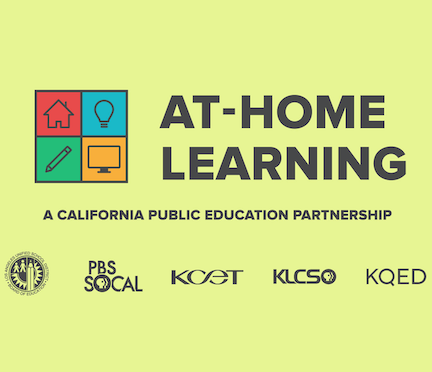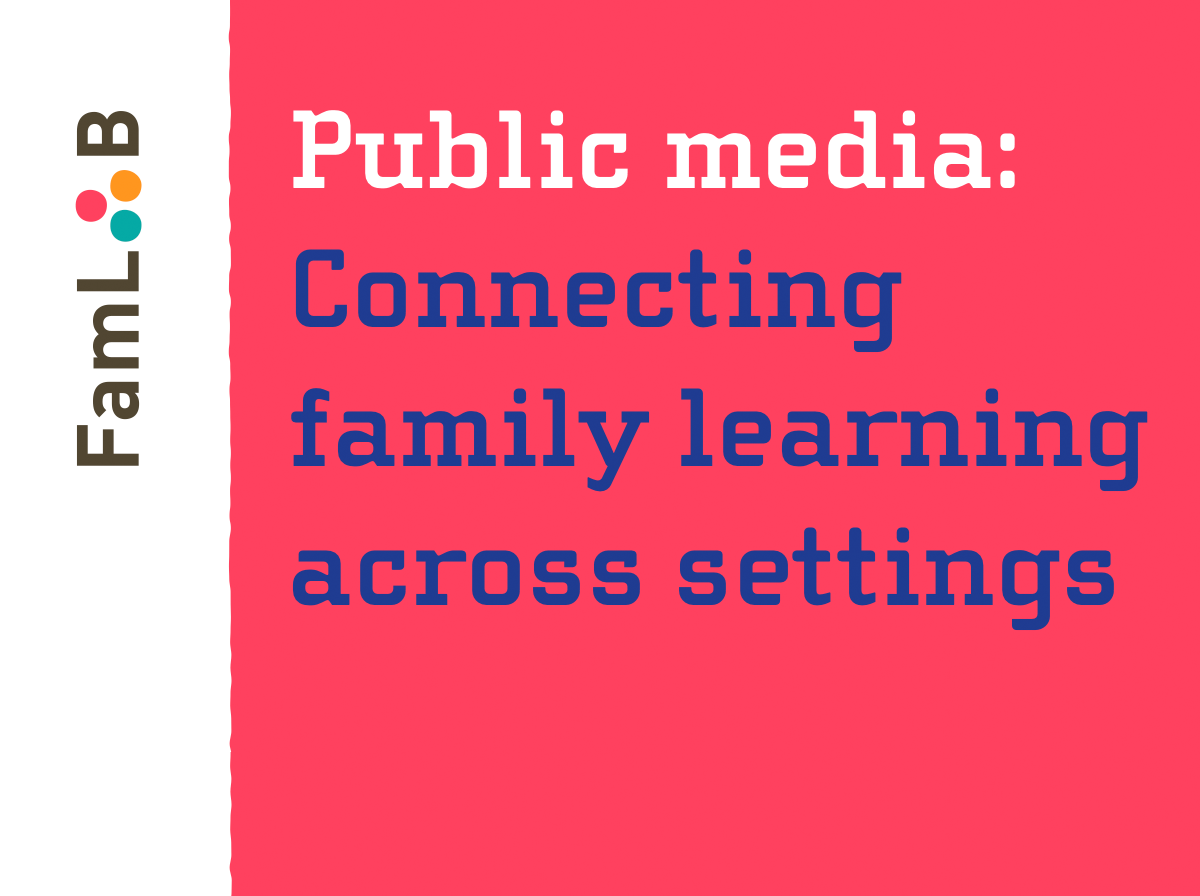 On Thursday, March 12, 2020, PBS SoCal, KCET and the Los Angeles Unified School District, the second-largest district in the nation, announced a plan to provide Pre-K–12th grade educational programming throughout the daytime on PBS SoCal, KCET, and KLCS channels. This partnership has the potential to serve more than 600,000 students across Southern California. This multi-platform initiative includes robust digital resources, created in collaboration with KQED in San Francisco, through our online platform, PBS LearningMedia.
On Thursday, March 12, 2020, PBS SoCal, KCET and the Los Angeles Unified School District, the second-largest district in the nation, announced a plan to provide Pre-K–12th grade educational programming throughout the daytime on PBS SoCal, KCET, and KLCS channels. This partnership has the potential to serve more than 600,000 students across Southern California. This multi-platform initiative includes robust digital resources, created in collaboration with KQED in San Francisco, through our online platform, PBS LearningMedia.
Public television has long served as a source of informal education and enrichment, providing cognitive stimulation aligned to educational curricula. Drawing on inspiration from Fred Rogers, PBS SoCal and KCET hope to bring some stability to families in our community during this time of school closures through the power of public media.
Today, children are growing up exposed to, using, and consuming more media than any other generation (Rideout, 2013). Research has shown that certain educational media content can help young children develop social skills, language skills, and even school readiness (Brown & Council on Communications and Media, 2011). Technology and media have changed the way children learn, and high-quality media can prepare learners to develop skills and knowledge. Sesame Street and other children’s media programs have demonstrated positive effects in improving children’s skills (Fisch et al., 1999; Cole et al., 2018).
Television is still very much a part of our environment. Despite the rapid proliferation of different content streams, families still come together in front of the television (Doran, 2015; Vittrup & Holden, 2011). PBS stations are vital partners in this family viewing time, as they work in their local communities to provide educational and engaging content to families who need it most— whole-child, whole-families, and whole-communities. In addition, that’s where PBS SoCal and KCET can have the most significant impact in responding to emergencies like COVID19. We are a vital resource, providing innovative and research-based content that has the potential to improve outcomes for students affected by school closures.
PBS SoCal and KCET have built a programming schedule to support all students beginning on Monday, March 16, with blocks of educational programming. We are also working to create content and digital resources—designing content like educational, grade-specific scripts for curriculum-driven programming breaks. Furthermore, we are aligning digital resources for educational tie-ins to broadcast programming that families and educators can access through PBS LearningMedia. In this way, PBS SoCal and KCET are placing collaborative media and digital resources where educators and families can draw upon them when connecting learning across settings (Takeuchi et al., 2019).
PBS LearningMedia can provide opportunities for educators to stay connected and support their students. Notably, interactive media are most effective when age-appropriate for children and include the use of digital literacy and curriculum implementation in classrooms as well as at home to supplement to traditional learning (NAEYC & Fred Rogers Center 2012; Penuel et al., 2012). As such, we are also working in partnership with the Los Angeles Unified School District Division of Instruction Office, listening to their needs and helping them integrate PBS shows into their weekly, at-home activities. Instructional administrators have designed activities that fit within their available time and resources, drawing on PBS shows and creating links between enriched media-based experiences and classroom-based activities for students and families to learn together. With this model, we have the potential to ease the stresses of COVID-19 in a small but important way by providing families with access to online, on-air resources accessible through television and mobile devices.
PBS SoCal and KCET are developing a new education service model to meet the needs of educators and families in innovative, cross-disciplinary, and collaborative ways. We have been leading grassroots education outreach focused on technology, teachers, and parents since implementing Ready To Learn in 2011. Through Ready To Learn, PBS SoCal and KCET have partnered with school districts to improve access to early education opportunities in Los Angeles and Orange counties. Working with these partners, I’ve seen how media and digital resources brought families and students together in unexpected ways. Our at-home learning program can be the tool to connect home and school learning. Today, public media is proving its mission is more important than ever.
References
Brown, A., & Council on Communications and Media. (2011). Media use by children younger than 2 years. Pediatrics, 128(5), 1040-5.
Cole, C. F., Lee, J. H., Bucuvalas, A., & Sırali, Y. (2018). Seven essential elements for creating effective children’s media to promote peacebuilding: Lessons from international coproductions of Sesame Street and other children’s media programs. New Directions for Child & Adolescent Development, 2018(159), 55–69. https://doi-org.lib.pepperdine.edu/10.1002/cad.20229.
Doran, L. (2015). The common sense census: Media use by tweens and teens. Education Week, 35(13).
Fisch, S., Truglio, R., & Cole, C. (1999). The impact of Sesame Street on preschool children: A review and synthesis of 30 years’ research. Media Psychology, 1(2), 165-190.
Penuel, W., Bates, L., Gallagher, L., Pasnik, S., Llorente, C., et al. (2012). Supplementing literacy instruction with a media-rich intervention: Results of a randomized controlled trial. Early Childhood Research Quarterly, 27(1), 115-127.
Rideout, V. (2013). Zero to eight: Children’s media use in America 2013. Common Sense Media.
Takeuchi, L., Vaala, S., & Ahn, J. (2019). Learning across boundaries: How parents and teachers are bridging children’s interests. New York: The Joan Ganz Cooney Center at Sesame Workshop.
Vittrup, B., & Holden, G. (2011). Exploring the impact of educational television and parent-child discussions on children’s racial attitudes. Analyes of Social Issues and Public Policy, 11(1).
 Susana Beltran Grimm is Director, Early Learning at PBS SoCal, where she has spent the past 11 years developing and implementing innovative education initiatives. She has designed STEM parent curricula using learning technologies and PBS KIDS assets to launch a series of bilingual parent engagement workshops and is responsible for building, sustaining, and expanding mutually beneficial relationships between PBS SoCal and the Southern California community. Susana previously managed the Parent Institute for Quality Education parent engagement education programs. She has helped address the needs of communities with engaging educational content and enhanced the agency’s awareness and service knowledge. Susana has a Bachelor’s degree in Asian American Studies and a minor in Applied Psychology in Education from the University of California, Santa Barbara. She holds a Master’s degree in Public Administration from California State University, Long Beach and is pursuing a Doctor of Education in Learning Technologies with a focus in STEM Family Engagement at Pepperdine University.
Susana Beltran Grimm is Director, Early Learning at PBS SoCal, where she has spent the past 11 years developing and implementing innovative education initiatives. She has designed STEM parent curricula using learning technologies and PBS KIDS assets to launch a series of bilingual parent engagement workshops and is responsible for building, sustaining, and expanding mutually beneficial relationships between PBS SoCal and the Southern California community. Susana previously managed the Parent Institute for Quality Education parent engagement education programs. She has helped address the needs of communities with engaging educational content and enhanced the agency’s awareness and service knowledge. Susana has a Bachelor’s degree in Asian American Studies and a minor in Applied Psychology in Education from the University of California, Santa Barbara. She holds a Master’s degree in Public Administration from California State University, Long Beach and is pursuing a Doctor of Education in Learning Technologies with a focus in STEM Family Engagement at Pepperdine University.

